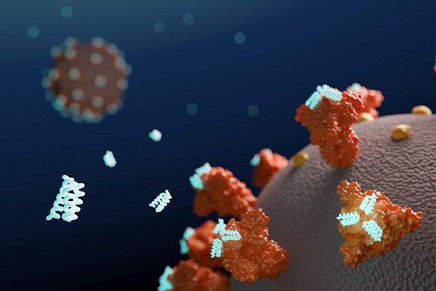Study Confirms That SARS-CoV-2 Infections Regulate Protein Arginylation And Also Discovers That Tannic Acids And Merbromin Can Reduce Viral Loads
Source: SARS-CoV-2 Research Nov 05, 2021 4 years, 3 months, 1 week, 2 days, 2 hours, 27 minutes ago
SARS-CoV-2 research: A new study by researchers from the University of São Paulo-Brazil has confirmed that SARS-CoV-2 infections regulate protein arginylation. The study team also discovered that tannic acids and merbromin can reduce viral loads.

The study findings were published on a preprint server and are currently being peer reviewed.
https://www.biorxiv.org/content/10.1101/2021.11.02.466971v1
Past studies have already confirmed that SARS-CoV-2 infection also induces endoplasmic reticulum (ER)-stress and may be associated with patient survival.
The unfolded protein response (UPR) pathway is highly conserved and regulates important cellular events such as growth, defense, homeostasis, and cell survival. Also, this pathway activation may also boost tissue repair processes. The degradation of misfolded/unfolded proteins is an essential element of proteostasis and occurs mainly in lysosomes or proteasomes, which degrade long-lived and short-lived proteins, respectively.
Ubiquitination is a universal tagging for protein degradation and is recognized by the proteasome. The N-terminal arginylation of proteins is characterized as an inducer of ubiquitination and proteasomal degradation by the N-end rule pathway.
A direct relationship between the half-life of a protein and its Nterminal residue has been demonstrated. While methionine promotes protein stability, other amino acids, including arginine, result in rapid degradation.
Studies have demonstrated the arginylation of different proteins in oxidized cysteine residues or aspartic acid and glutamic acid exposed at the N-terminus. N-terminal asparagine and glutamine are tertiary destabilizing residues, as they can undergo an enzymatic deamidation reaction and be converted into glutamic acid and aspartic acid, recognized as secondary. Thus, arginylated proteins or protein fragments with tertiary and secondary residues exposed at the N-terminus are universally recognized as marked for degradation through the ubiquitination-proteasome pathway. Moreover, internal aspartic and glutamic acids have been found to be sites specifically arginylated on several proteins involved in different biological processes. Protein arginylation has been associated with cellular stress conditions, including ERstress, oxidative stress, and misfolded protein stress. Under these conditions, arginylation promotes cell death or growth arrest. Furthermore, the activity of arginyltRNA-protein transferase (ATE1), the enzyme that promotes arginylation, is necessary to decrease mutation events when a cell is subjected to stressful conditions that damage DNA.
In 2002, the knockout of the ATE1 gene resulted in abnormalities in essential processes such as cardiac development, angiogenesis, and tissue morphogenesis in mammals.
https://pubmed.ncbi.nlm.nih.gov/21784066/
The
SARS-CoV-2 research team conducted a study on the modulation of the N-end rule pathway and protein arginylation in Vero CCL-81 and Calu-3 cells infected after 2h, 6h, 12h, 24h, and 48h. A reanalysis of public omics data combined with western blotting was p
erformed to measure the levels of ATE1 and arginylated proteins.
Initially, the basal levels of enzymes involved in the N-end rule pathway were evaluated in different uninfected cells and compared to the total proteome profile. Enzymes involved in protein arginylation (ATE1), ubiquitination (UBR1, UBR2, UBR4, UBR5), arginine-tRNA ligase assembly (RARS2), deamidation (NTAN1), and N-terminal methionine removal (CASP6, CASP7, CASP8, CASP9, METAP1, METAP2, CASP10, CASP2, CASP3, CAPN7, CAPN1, CAPN2, CAPN5) were identified in all cell models with no statistical difference among them. These findings indicated that enzymes involved in the protein arginylation pathway were not modulated based on cell type or on specie in uninfected conditions. A total of 1,152 proteins have the potential to be arginylated at the N-terminus (NtE, NtD, NtC, NtN, NtQ), in agreement with the UniProt sequence. These proteins were identified in uninfected Calu-3, Vero E6, Caco-2, and ACE2-A549 cell lines showing a similar expression pattern, regardless of the organism (Green Monkey and Human)
Interestingly this regulation is seen specifically during infections by coronaviruses.
The study findings demonstrate that during SARS-CoV-2 infection there is an increase in the expression of the ATE1 enzyme associated with regulated levels of specific arginylated proteins. On the other hand, infected macrophages showed no ATE1 regulation. An important finding revealed that modulation of the N-end rule pathway differs between different types of infected cells.
The study findings also confirmed the potential of tannic acid to reduce viral load, and furthermore, to modulate ATE1 levels during infection. In addition, the arginylation inhibitor merbromin (MER) is also capable of both reducing viral load and reducing ATE1 levels.
Taken together, these data show the importance of arginylation during the progression of SARS-CoV-2 infection and open the door for future studies that may unravel the role of ATE1 and its inhibitors in pathogen infection.
For the latest
SARS-CoV-2 research, keep on logging to Thailand Medical News.
